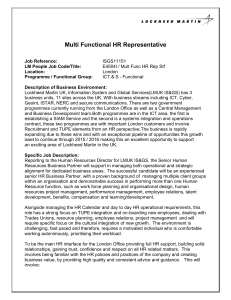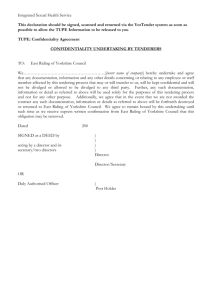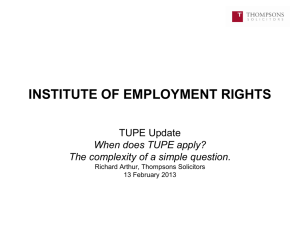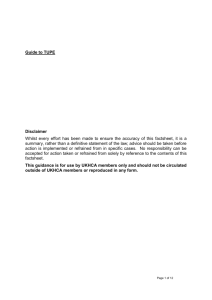WHAT DOES TUPE MEAN? TUPE stands for the Transfer of
advertisement
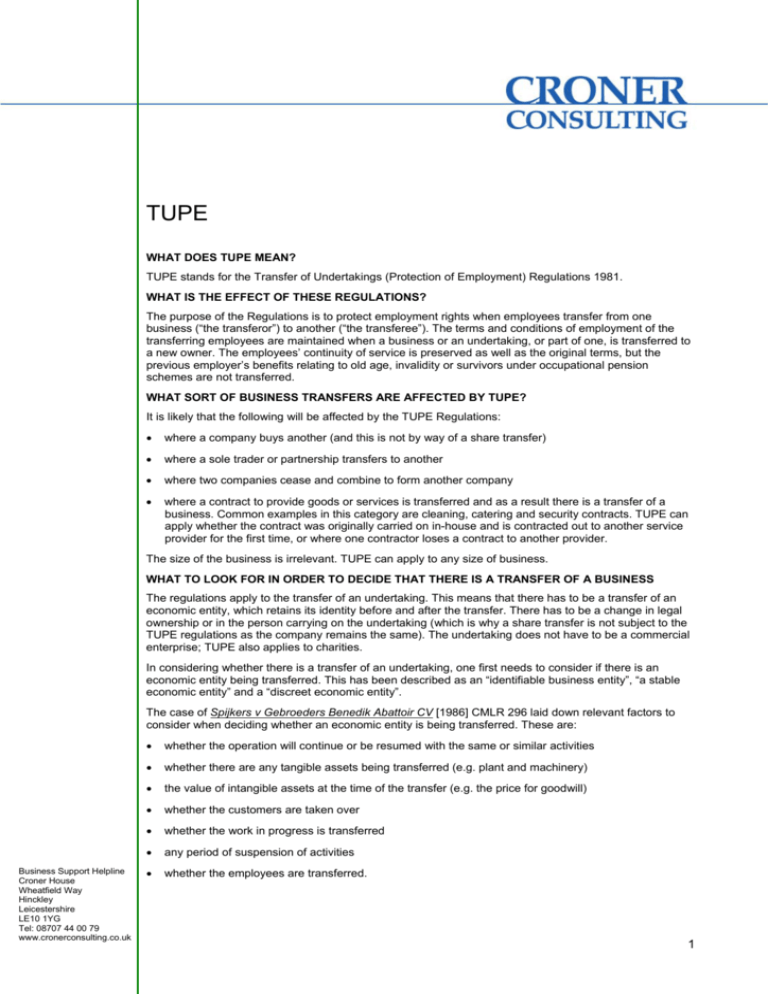
TUPE WHAT DOES TUPE MEAN? TUPE stands for the Transfer of Undertakings (Protection of Employment) Regulations 1981. WHAT IS THE EFFECT OF THESE REGULATIONS? The purpose of the Regulations is to protect employment rights when employees transfer from one business (“the transferor”) to another (“the transferee”). The terms and conditions of employment of the transferring employees are maintained when a business or an undertaking, or part of one, is transferred to a new owner. The employees’ continuity of service is preserved as well as the original terms, but the previous employer’s benefits relating to old age, invalidity or survivors under occupational pension schemes are not transferred. WHAT SORT OF BUSINESS TRANSFERS ARE AFFECTED BY TUPE? It is likely that the following will be affected by the TUPE Regulations: • where a company buys another (and this is not by way of a share transfer) • where a sole trader or partnership transfers to another • where two companies cease and combine to form another company • where a contract to provide goods or services is transferred and as a result there is a transfer of a business. Common examples in this category are cleaning, catering and security contracts. TUPE can apply whether the contract was originally carried on in-house and is contracted out to another service provider for the first time, or where one contractor loses a contract to another provider. The size of the business is irrelevant. TUPE can apply to any size of business. WHAT TO LOOK FOR IN ORDER TO DECIDE THAT THERE IS A TRANSFER OF A BUSINESS The regulations apply to the transfer of an undertaking. This means that there has to be a transfer of an economic entity, which retains its identity before and after the transfer. There has to be a change in legal ownership or in the person carrying on the undertaking (which is why a share transfer is not subject to the TUPE regulations as the company remains the same). The undertaking does not have to be a commercial enterprise; TUPE also applies to charities. In considering whether there is a transfer of an undertaking, one first needs to consider if there is an economic entity being transferred. This has been described as an “identifiable business entity”, “a stable economic entity” and a “discreet economic entity”. The case of Spijkers v Gebroeders Benedik Abattoir CV [1986] CMLR 296 laid down relevant factors to consider when deciding whether an economic entity is being transferred. These are: Business Support Helpline Croner House Wheatfield Way Hinckley Leicestershire LE10 1YG Tel: 08707 44 00 79 www.cronerconsulting.co.uk • whether the operation will continue or be resumed with the same or similar activities • whether there are any tangible assets being transferred (e.g. plant and machinery) • the value of intangible assets at the time of the transfer (e.g. the price for goodwill) • whether the customers are taken over • whether the work in progress is transferred • any period of suspension of activities • whether the employees are transferred. 1 Such factors cannot be considered in isolation – the overall picture has also to be considered. In the case of ECM (Vehicle Delivery Service) Limited v Cox [1999] IRLR 559 CA (“ECM”) there was an attempt to argue that a decision not to transfer the staff might be a way of avoiding a transfer taking place, but this was not upheld by the Court of Appeal. WHAT ABOUT ASSETS? The judgement in (Suzen v Zehnacker Gebaudereinigung GmbH Krankenhausservice [1997] IRLR 255 ECJ (“Suzen”) stated that there was not a transfer of a cleaning contract, if no tangible or intangible assets were transferred, or if a major part of the workforce was not taken over by the new employer. The Suzen judgement has however, been reconsidered in several subsequent cases. In ECM it was noted by Mummery LJ that the importance of Suzen had been overstated. In Sanchez Hidalgo v Asociacion de Servicios Aser [1999] IRLR 136 it was stated that an economic entity did not necessarily have to have significant assets whether “material or immaterial”. In this case it was recognised that in certain industry sectors, such as cleaning and surveillance, the assets are essentially based on manpower and that it was possible for a group of workers who are assigned to a common task to be an economic entity. This point was confirmed by the Employment Appeal Tribunal in the case of Cheeseman and others v R Brewer Contracts Ltd [2001] IRLR 144. CONSULTATION REQUIREMENTS ON A TUPE TRANSFER When there is a TUPE transfer, the employers of all employees affected (transferor and transferee) are required to consult either elected workers’ representatives or the representatives of a trade union. The election of workers’ representatives should be properly conducted with a voting system and as far as is reasonably practicable, voting should be carried out in secret. The consultation should be carried out long enough before the transfer to ensure that there is adequate consultation. If there are special circumstances (such as an overnight loss of a contract), which mean that an employer may not be able to fulfil any of the requirements for consultation or providing information, he must do what is reasonably practicable to meet the requirements. Failure to follow the consultation requirements can result in the employees, regardless of their length of service, claiming protective awards of up to thirteen weeks’ pay at the Employment Tribunal to cover the period for which they should have been consulted. The employer is required to tell the employees affected by the transfer the following information: • when and why the transfer is to take place • the legal, economic and social implications of the transfer for the affected employees • any measures which the transferor and transferee intend to take which will affect the employees. PROTECTED EMPLOYEES Employees are protected from unfair dismissal if they have more than one year’s service and are dismissed in connection with a TUPE transfer. An employer (whether the transferor or transferee) can dismiss lawfully under the Regulations if there is an economic, technical or organisational reason entailing changes in the workforce. In Berriman v Delabole Slate Ltd [1985] IRLR 305, the Court of Appeal held that these words meant that there had to be a change in the strength or establishment of the workforce, eg a reduction in numbers or a change in the profile of jobs. It is very likely that this will result in redundancies and in those circumstances the usual redundancy procedures will apply (see the factsheet on Redundancies for further information). Employees’ contracts cannot be varied in connection with a TUPE transfer. The employees’ contracts, which they had with the previous employer, have to be honoured by the new employer. This was confirmed by the House of Lords in the case of Wilson v St Helens Borough Council [1998 IRLR 706]. Even agreed changes, for example where the employees are to benefit from the changes are unlawful, if the changes are made as a result of a TUPE transfer. Business Support Helpline Croner House Wheatfield Way Hinckley Leicestershire LE10 1YG Tel: 08707 44 00 79 www.cronerconsulting.co.uk 2 FURTHER ADVICE There is no doubt that the TUPE regulations and the various relevant cases, are complex. Employers are encouraged to ask for further information or discuss their specific cases with the Helpline service. This fact sheet is an outline of the position at the time of writing. It offers general guidance only and should not be regarded as a complete or authoritative statement of law. No part of this fact sheet should be copied or transmitted to any third party. If you wish to adapt the fact sheet for your own internal use, you must contact the Helpline before doing so. This fact sheet is not a substitute for accessing the Helpline If you currently subscribe to an insured advisory service through Croner Consulting your insurance for a particular issue covered by this policy could be invalidated if you do not access advice via our Helplines Service and follow such advice in accordance with the terms of your policy. Business Support Helpline Croner House Wheatfield Way Hinckley Leicestershire LE10 1YG Tel: 08707 44 00 79 www.cronerconsulting.co.uk 3
